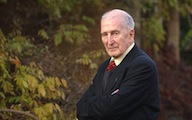 I stumbled across an online article in eSkeptic about Antony Flew. I thought readers might be interested; so here’s the gist of the piece, authored by Kenneth Grubbs.
I stumbled across an online article in eSkeptic about Antony Flew. I thought readers might be interested; so here’s the gist of the piece, authored by Kenneth Grubbs.
Flew (1923-2010) was a prominent British atheist philosopher and author, starting with a thunderbolt, Theology and Falsification (1950). Then, in 2007, HarperOne published There Is A God – How the World’s Most Notorious Atheist Changed His Mind – purportedly by Flew. The book’s main progenitor was co-author Roy Varghese, a Christian polemicist, who actually wrote most of it, with an appendix by a Bishop, and an unacknowledged re-write by an evangelical pastor.
Varghese asserts that anyhow, Flew “signed off” on the manuscript; and that he had a prominent Christian apologist friend of Flew verify that Flew did embrace the book’s content, and was mentally competent. However, not long after, Flew was institutionalized with severe dementia. His longtime wife avowed that he died a “deist.”
A 2007 NY Times Magazine piece by Mark Oppenheimer (which I perused) reviewed this tale, describing a lengthy tug-of-war, between atheist and religionist proponents, over Flew’s mind, which was gradually deteriorating. Oppenheimer declined to conclude that the last book was a contrivance by Varghese, taking advantage of Flew’s declining mental state, and giving both the benefit of the doubt. But, Oppenheimer told Grubbs, “The most disappointing thing . . . is the cynicism of the publishing industry.”
So what’s in the book? Grubb suggests that such a dramatic conversion as Flew’s ought to have been the result of equally dramatic new insights. Yet the book is just a farrago of shopworn theistic sophistry – which Flew had cogently refuted in a half century of prior works – the argument from design, the anthropic argument, and even the claim that God must exist because it can’t be disproven – an idea that Flew had earlier treated with contempt.
Grubb, like Oppenheimer, professes agnosticism about what really happened, content to query, “Did [Flew] change his mind, or did his mind change him?” In so many human situations “truth” can be complex and elusive. But I do think the whole episode highlights the fundamental intellectual disingenuousness of religious propagandists in general. I often wonder how many truly believe what they say, or whether they do it for other reasons. (Of course, the meaning of the word “believe” in this context is also problematical.)
Originally published on The Rational Optimist.
